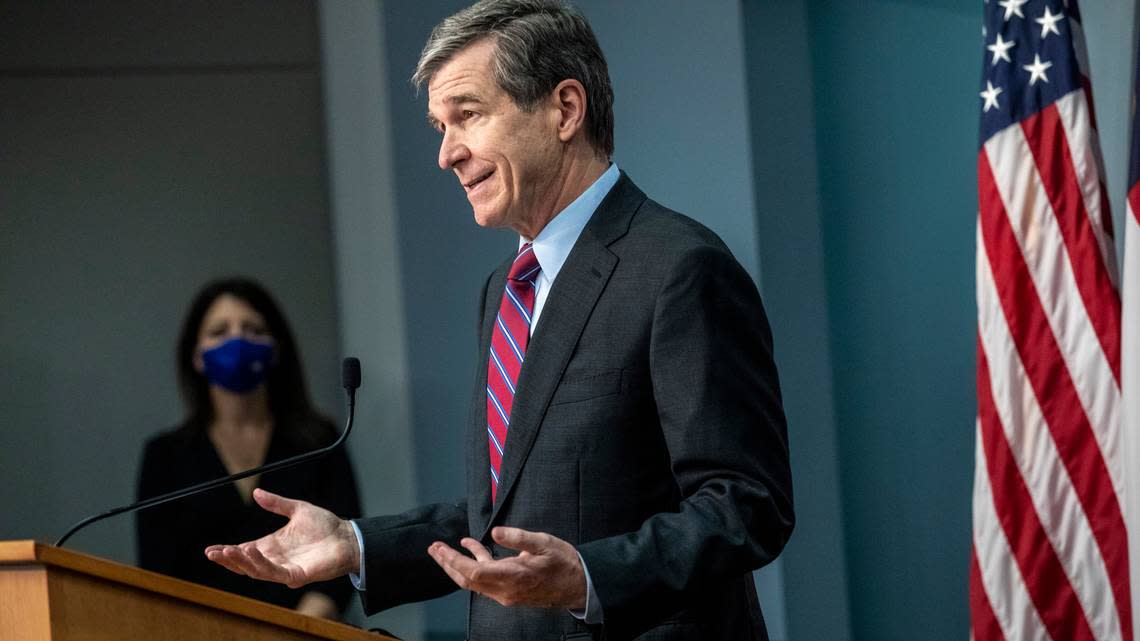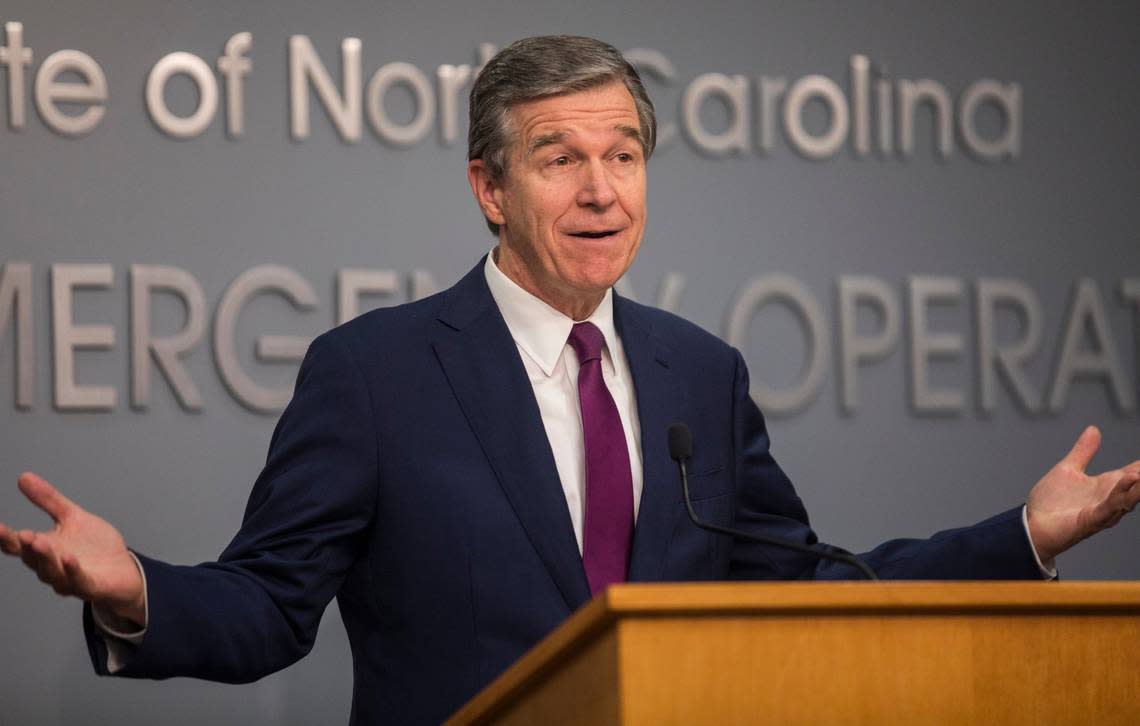NC’s COVID state of emergency will end this summer. Here’s how we got to this point
Two-and-a-half years after North Carolina was placed under a state of emergency because of the COVID-19 pandemic, Democratic Gov. Roy Cooper said he’ll soon lift it.
It has been nearly a year since there were any restrictions on the public because of the COVID-19 pandemic, but Cooper kept continuing the state of emergency via multiple executive orders. When he signed the state budget into law on Monday, he announced he’ll lift the emergency order on Aug. 15.
Here’s a timeline of the state of emergency:
March 2020
Cooper declares a state of emergency on March 10, 2020, a week after the coronavirus pandemic is confirmed to have reached North Carolina. A few days later, Cooper issues an executive order closing K-12 public schools for two weeks and another order restricting businesses.
They are the first of many orders that restrict in-person activities, including schools, restaurant operations, bars, gyms, playgrounds, entertainment venues, sporting events, amusement parks, other businesses and social gatherings, aimed at curbing the spread of the virus. New executive orders imposing and lifting restrictions extend the declaration each time it is set to expire.
Summer 2020
Republican lawmakers send bill after bill to Cooper to lift restrictions and prevent new ones. Some of the bills propose requiring agreement from the rest of the Council of State, made up of 10 statewide elected officials including the governor, lieutenant governor, attorney general and labor commissioner. Cooper vetoes them all.
More executive orders and extensions of the emergency declaration continue through the fall, with vaccinations not yet available and COVID-19 cases continuing to send people to the hospital.
December 2020
The first vaccines arrive in North Carolina and are rolled out in phases through spring of 2021. While most restrictions are lifted, a mask mandate remains in place along with the state of emergency.

May 2021
Cooper tells reporters in April that he expects to lift most COVID-19 restrictions by June — except for masks. But the Centers for Disease Control and Prevention in May changes its guidance that everyone should wear masks. Instead it calls for only unvaccinated people to wear them. Cooper subsequently lifts the statewide mask mandate in most settings aside from places like schools and prisons.
“The bottom line here: People should get vaccinated,” Cooper tells The News & Observer.
Summer 2021
Cooper tells reporters that the state of emergency, now more than a year old, is still needed months after vaccinations are readily available because, “it’s allowing us to waive state and local regulations to be able to get vaccines to these people faster, so it’s an important part of getting this pandemic behind us.”
By the end of July, COVID-19 restrictions are lifted statewide and the power is shifted to local governments for mask mandates and any other rules. North Carolina’s state of emergency remains.
September 2021
Republican lawmakers continue to propose legislation limiting Cooper’s emergency powers. A version of the bills ends up in the budget bill sent to Cooper later that fall, after months of closed-door negotiations between Cooper and Republican and Democratic legislative leaders.

November 2021
In early November, Cooper vetoes the latest attempt by the legislature to limit his emergency powers. A few weeks later, though, Cooper signs the 2021 state budget into law, saying the good outweighs the bad. It includes a policy provision about emergency powers.
The law, which goes into effect Jan. 1, 2023, limit states of emergency in the future to 30 days without a vote from the Council of State. The council currently has a 6-4 Republican majority. After 60 days, the General Assembly would also have to agree to an extension. When Cooper says he’ll sign the 2021 budget, he tells reporters that the 2023 timeline allows for time to prepare for the change.
March 2022
House Speaker Tim Moore, a Kings Mountain Republican, marks the two-year anniversary of the state of emergency declaration by showing reporters a letter signed by his caucus calling for an end to the declaration, along with a “2” balloon and cake. House Republicans also send the Cooper administration a letter, to which N.C. Department of Health and Human Services Secretary Kody Kinsley responds with a list of how the declaration is still needed for things like liability protection for the state health director and waiving regulations for healthcare facilities.

June 2022
COVID-19 vaccinations become available for the youngest group of people: children from 6 months old through age 5. Vaccinations have already been available to other age groups, with some encouraged to get one or two boosters.
July 2022
Cooper signs the 2022 state budget into law on July 11 and announces he will lift the state of emergency on Aug. 15.
“The budget includes the changes in the law requested by the NC Department of Health and Human Services to ensure flexibility that is currently made possible by the Governor’s COVID-19 State of Emergency,” Cooper says in a statement.
House Majority Leader John Bell, a Wayne County Republican, had repeatedly called for an end to the state of emergency. On July 11, Bell touts the change and the 2021 budget provision limiting future states of emergency.
“I’m glad it’s finally coming to an end and there are now safeguards in place to prevent a governor from having unlimited and unchecked emergency executive authority going forward,” Bell says in an emailed statement to The N&O.
For more North Carolina government and politics news, listen to the Under the Dome politics podcast from The News & Observer and the NC Insider. You can find it at https://campsite.bio/underthedome or wherever you get your podcasts.
